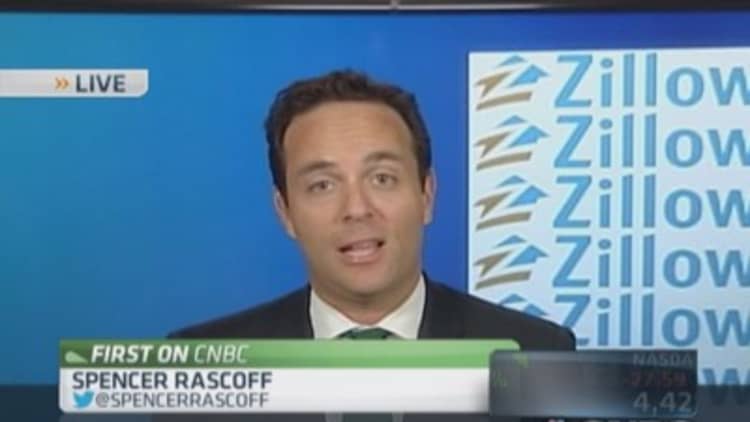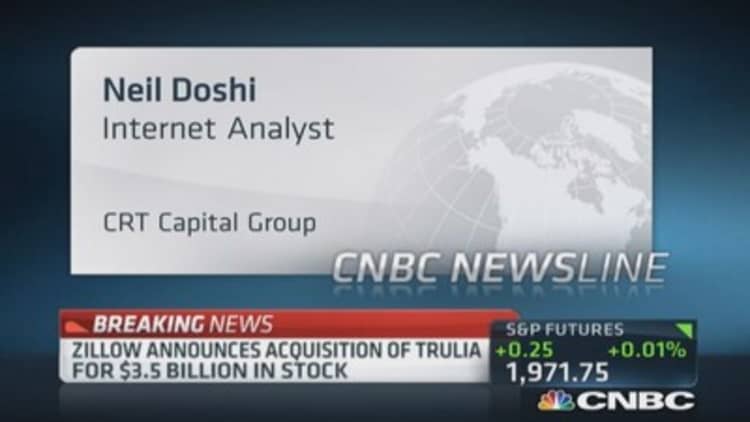
Real estate website Zillow will buy competitor Trulia for $3.5 billion in stock, but Realtors shouldn't be too concerned about the combined company hurting business, said Tim Rood, a former Fannie Mae executive who is now partner and managing director of Collingwood Group.
"Realtors, they're independent contractors. They just want to win more customers. So if Zillow wants to spend all of its money advertising and Realtors can get more targeted, pre-qualified buyers, they're perfectly happy," Rood said in an interview with CNBC's "Street Signs."
However, he said there are a number of things about the Zillow-Trulia business model that will promote the high producers at the detriment of the low producers who only sell a few houses a year. That, in turn, can hurt the National Association of Realtors and the multiple listing services. About 80 percent of real estate sales go to 20 percent of the producers, but 100 percent of them pay dues to the National Association of Realtors and the multiple listing services, he noted.
"Some producers—two, three properties a year, it doesn't take much to kick them out and therefore you're going to lose potentially ... 80 percent of your revenue," Rood said.
Analyst Bradley Safalow of PAA Research, who is short shares of Zillow, said neither company has changed the game at this point.
"They already have vast consumer traffic yet very little has changed in terms of their lead quality, lead volume or even the underpinnings of how the residential real estate industry works and that's because at the end of the day, 80 to 98 percent of residential real estates are chosen based on referrals," he said.

Zillow CEO Spencer Rascoff told CNBC the deal will add value for both shareholders and consumers alike.
"Our companies have always admired each other. ... This most recent deal came together over the last six weeks when we approached Trulia and said we thought now would be a great time to combine," Rascoff said on "Squawk Alley." "Having multiple bands allows you to be more relevant to more consumers and a larger audience and that, in turn, helps with your ability to help advertisers reach that audience."
As part of the deal, which is expected to close next year, both consumer brands will remain and Rascoff will run the combined company.
Trulia shareholders will get 0.444 shares of Zillow stock for each Trulia share. In turn, Trulia shareholders will receive a one-third stake in the combined company at closing.
Though Zillow's stock had been trading near highs when the deal was brokered, Trulia's board was still happy to be paid in all Zillow stock, Rascoff said.
"I think the Trulia board, on behalf of Trulia shareholders, think that we're just getting started, and they wanted stock," Rascoff said. "They wanted to share in the combined upside of this new company because both sides, Zillow and Trulia, think we're just getting started. That there's a long, long road ahead."

Reaction to the deal on Wall Street was largely positive.
Trulia shares rose more than 11 percent Monday to around $63 a share. The stock had traded below $30 as recently as May 9. Zillow fell more than 3.5 percent.
"At the end of the day, this provides scale. And scale ultimately leads to more advertising on the overall network," said Neil Doshi, an Internet analyst at CRT Capital Group.
The companies cited the potential for $100 million in cost "avoidances" by 2016.
Regulators will take a close look at this deal, Doshi said on CNBC's "Squawk Box," adding that competitors such as Realogy would likely voice their opposition.
Read MoreCEOs sold stock going into merger news
"This is a very large market and a very fragmented market. It's probably a $10 billion market in terms of total marketing that happens by real estate agents," he said. "If we look at the revenue of the both combined Zillow and Trulia, it's less than about 12 percent [of that total]."
Rascoff played down any regulatory concerns, though. arguing the consumer audience and real estate broker advertising budgets are "very fragmented."
Read MoreTrulia, Zillow spiked on merger talk
—By CNBC Staff

